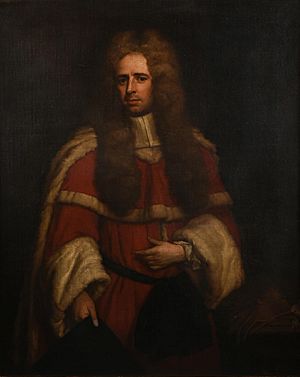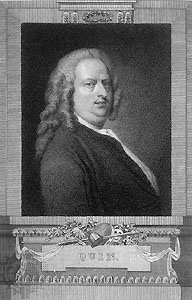William Whitshed facts for kids
Quick facts for kids
William Whitshed
|
|
|---|---|

William Whitshed in a portrait by Jonathan Richardson
|
|
| Lord Chief Justice of Ireland | |
| In office 1714–1727 |
|
| Monarch | George I |
| Preceded by | Sir Richard Cox, Bt |
| Succeeded by | John Rogerson |
William Whitshed (1679–1727) was an important Irish politician and judge. He served as the top legal advisor, called the Solicitor-General, and later became the highest judge in Ireland, the Lord Chief Justice of Ireland. Just before he died, he was made Chief Justice of the Irish Common Pleas.
Whitshed became a Member of Parliament for County Wicklow in 1703. He was appointed Solicitor-General in 1709. From 1714 until 1727, he held the powerful position of Lord Chief Justice. He is mostly remembered for his strong disagreements with the famous writer Jonathan Swift. Swift often criticized Whitshed, comparing him to a judge known for being unfair. Their conflict mainly started because of a trial involving Swift's publisher.
Contents
Early Life and Career
William Whitshed was born in Dublin in 1679. His family had been important merchants and politicians in Dublin for a long time. His father, Thomas Whitshed, was also a lawyer and a member of the Irish House of Commons. William's mother was Mary Quin, whose father, Mark Quin, was a very rich citizen and served as Lord Mayor of Dublin.
William was the oldest of thirteen children. His cousin, James Quin, became a very famous actor. William Whitshed's sister, Mary, married John Parnell, who was also a politician and a judge.
Whitshed started studying law in 1694 and became a lawyer in Ireland. Many people were surprised by how quickly he rose to power. Becoming Lord Chief Justice at just 35 years old was very unusual. His family's wealth and political connections helped him a lot. He also had the support of William King, the Archbishop of Dublin, who had a lot of influence over who became a judge.
Conflict with Jonathan Swift
William Whitshed wanted to become even more powerful. He hoped to become the Lord Chancellor of Ireland, which is a very high legal position. This ambition might have led to his famous conflict with the writer Jonathan Swift.
The Trial of Edward Waters
In 1720, Whitshed was the judge in the trial of Edward Waters. Waters was Swift's publisher and had printed a pamphlet called On the Universal Use of Irish Manufacture. The government believed this pamphlet was seditious, meaning it encouraged rebellion against the government.
The jury found Waters guilty, but it was a difficult process. The jury tried nine times to say he was not guilty before finally agreeing on a guilty verdict. Swift was not bothered by this and instead made fun of Whitshed and the other judge in his writings.
The Drapier Letters
In 1724, the government again tried to go after Swift, but indirectly. John Harding, who printed Swift's Drapier Letters, was arrested. The government wanted Whitshed to convince a grand jury that the Drapier Letters were seditious.
However, Whitshed failed completely. Even though he tried very hard and spoke to the jurors individually, they refused to find Harding guilty. This made Swift even angrier. He wrote many harsh poems and verses attacking Whitshed. The government was embarrassed by the whole situation and did not protect Whitshed much, as public opinion was on Swift's side.
Later Life and Death
Whitshed's dream of becoming Lord Chancellor never came true. His supporter, Archbishop King, was losing influence. Also, the conflict with Swift made Whitshed very unpopular. People in the government openly said that someone so disliked could not become Lord Chancellor.
In 1726, Whitshed asked to be moved to a different court, the Court of Common Pleas. He said that his current job was too much for him as he got older. In 1727, it was decided he would become Chief Justice of the Irish Common Pleas. However, he died suddenly shortly after, at only 48 years old.
Some of his friends believed that Swift's harsh attacks had made him sick. Others thought he did not get proper medical care. William Whitshed was not married and had no children. His property went to his next oldest brother.
How He Is Remembered
Some historians say that Whitshed was well-liked when he was younger. However, he became very unpopular later in life, even among government officials. Another legal historian, Bartholomew Duhigg, said that Whitshed sometimes made decisions based on his personal feelings. But he also agreed that Whitshed did not take bribes and lived a good personal life.]
 | Valerie Thomas |
 | Frederick McKinley Jones |
 | George Edward Alcorn Jr. |
 | Thomas Mensah |


